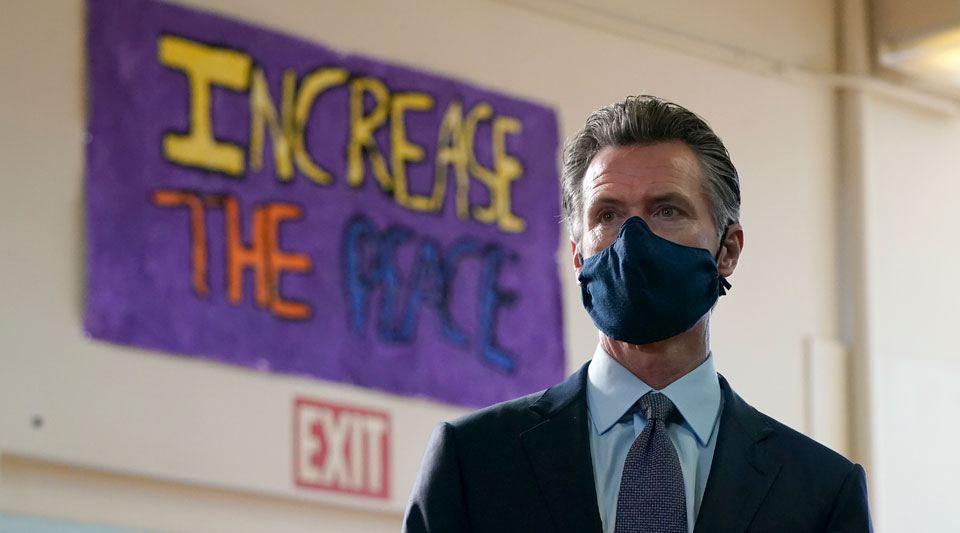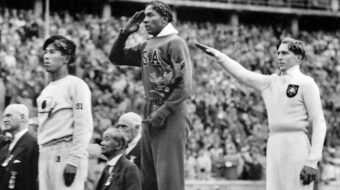
SACRAMENTO—As hundreds of bills passed by the California legislature last month wend their way across Gov. Gavin Newsom’s desk, among the most closely watched has been Senate Bill 2, the Kenneth Ross Jr. Decertification Act of 2021, which for the first time creates a process to decertify California law enforcement officers who have committed serious misconduct.
Until now, California has been one of just four states in the U.S. without such a process.
On Sept. 30, Newsom signed the measure, introduced by state Sen. Steven Bradford, D-Gardena and Senate President pro Tempore Toni Atkins, D-San Diego, at Rowley Park, where Kenneth Ross, Jr., for whom SB 2 was named, was fatally shot by a police officer in 2018.
“Too many lives have been lost due to racial profiling and excessive use of force,” Newsom said. “We cannot change what is past, but we can build accountability, root out racial injustice, and fight systemic racism.”
Calling the signing “bittersweet” because it followed “the unnecessary loss of lives due to rogue policing,” Bradford said the new law “will end the wash, rinse, and repeat cycle of police misconduct and ensure all officers in California are held to the same fair and appropriate standards.”
California Attorney General Rob Bonta called the signing “a monumental step forward on the path to justice,” while Atkins declared, “400 years of racism won’t be erased overnight—but the arc is bending and the moral momentum is on our side.”
It took two years of persistent struggle to guide SB 2 through the legislature. Its predecessor ran aground last year amid strong opposition from law enforcement groups, as the pandemic-harried 2020 legislative session ended. And during this year’s legislative process, Bradford amended it to require a two-thirds vote of the state’s Commission on Police Officer Standards and Training (POST) and an advisory board’s finding of “clear and convincing” evidence of misconduct. Though law enforcement organizations remained opposed, the bill passed both legislative houses by substantial margins.
SB 2 headed the priority list of the California Legislative Black Caucus, which Bradford chairs.
Among seven more measures the governor signed to strengthen police responsibility and accountability was another of the Legislative Black Caucus’ social justice priorities, Assembly Bill 26 by Assemblymember Chris Holden, D-Pasadena, establishing clear guidelines for police officers to intervene and report immediately when another officer uses excessive force.
Also known as “the George Floyd law,” AB 26 clarifies existing California law that requires an officer to intervene when seeing another officer using excessive force, and if possible, to halt that use of force. AB 26 also mandates that the witnessing officer report the incident to dispatch or to the watch commander in real time, requires that an officer seeing but failing to report such an incident be disciplined, and bars retaliation against an officer making such a report.
Newsom’s signing AB 26 marks “a big step forward for police responsibility and accountability,” Holden said. “Instituting these core values is paramount to building public trust that has eroded between law enforcement and communities across California.”
A measure of particular interest to people participating in peaceful protest demonstrations is AB 48, by Assemblymember Lorena Gonzalez, D-San Diego, which sets California’s first statewide standards regulating law enforcement’s use of projectile weapons and chemical agents for crowd control.
Last year, during the nationwide protests following the murder of George Floyd by Minneapolis police, there were many reports of severe injuries after police officers attacked peaceful protesters, reporters, and bystanders with pepper spray, tear gas, and rubber bullets.
AB 48 requires that before using such weapons, officers must first try de-escalation techniques, and order demonstrators to leave, and that police must be trained on how to use them safely when someone is at risk of serious injury, or when such weapons are essential to safely control an unlawful and dangerous situation. The law bans firing the weapons indiscriminately into a crowd or aiming them at vital organs. Police must also report their use to the state Attorney General’s office and explain why it was necessary.
SB 16, by state Sen. Nancy Skinner, D- Berkeley, builds on Skinner’s groundbreaking 2018 law that opened a limited set of California police records to public access for the first time in over four decades.
The new law expands the categories of records the public can access and closes loopholes that keep some misconduct records out of public view. It opens public access to records on officers engaging in biased or discriminatory behavior, conducting unlawful arrests or searches, or using excessive or unreasonable force, and who failed to intervene when another officer used excessive or unreasonable force.
Skinner emphasized the ways SB 16 and SB 2 will work together.
“My bill, SB 16, ensures that we have the right to know when an officer uses excessive force or engages in racist or biased behavior,” she said. “And Sen. Bradford’s SB 2 ensures that officers with egregious records no longer have the privilege of wearing a badge in our state.”
Skinner added that the two bills also work in tandem to address the problem of police officers who commit misconduct and then move to another police department, because SB 16 mandates that records be released if an officer resigns before a misconduct investigation is complete, and that law enforcement agencies review a candidate’s prior history before making a decision on hiring.
The other bills Governor Newsom signed at Rowley Park Sept. 30:
- AB 89, by Assemblymember Reggie Jones-Sawyer, D-Los Angeles, raises the minimum wage to become a police officer from the present 18 to 21, and strengthens education requirements.
- AB 481, by Assemblymember David Chiu, D-San Francisco, would require local law enforcement agencies to get approval from their local governing bodies before acquiring military equipment.
- AB 490, by Assemblymember Mike Gipson, D-Carson, builds on Gipson’s bill last year that banned chokeholds. The new legislation bans restraints and transport methods that significantly reduce a person’s ability to breathe normally.
- AB 958, also by Gipson, requires law enforcement agencies to adopt policies preventing police officers from participating in law enforcement “gangs.”












Comments